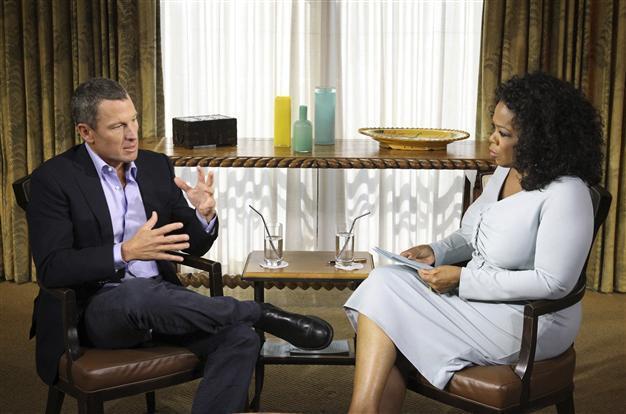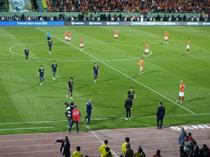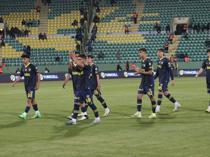Armstrong interview provokes little sympathy
MELBOURNE - The Associated Press

Lance Armstrong has ‘come clean’ about doping during his cycling career, but the disgraced athlete has not won any sympathy from the sporting world with the confessions made during an interview with Oprah Winfrey. REUTERS photo
Former rivals, friends and sporting figures were united in their condemnation of Lance Armstrong and his years of deception after the disgraced cyclist publicly confessed his years of doping in a television interview that aired on Jan. 18.Two-time Tour de France stage winner Robbie McEwen of Australia said he could never forgive Armstrong, adding he “deceived everybody on the planet, us included.”
World Anti-Doping Agency president John Fahey told The Associated Press in a telephone interview that Armstrong’s assertion in his interview with Oprah Winfrey that he wasn’t cheating when he took part in doping through his seven Tour de France wins “gives him no credibility.”
Tennis’ top-ranked player Novak Djokovic was even more succinct in his judgment, telling reporters at the Australian Open in Melbourne that Armstrong “should suffer for his lies all these years.”
Not enough
Journalist David Walsh, whose articles and books had detailed the American cyclist’s use of banned substances, said the interview did not go far enough in revealing details of his actions.
“It didn’t go far enough. ... He has to name names...He is probably the biggest cheat sport has ever known,” Walsh said on the BBC.
However cycling’s governing body, the UCI, welcomed Armstrong’s confession, saying in a statement it was “an important step forward on the long road to repairing the damage that has been caused to cycling and to restoring confidence in the sport.”
McEwen, speaking from Adelaide ahead of the pro tour-opening Tour Down Under, said he and fellow riders were just as deceived as the public.
“We wanted to believe, like everybody, that the Tour (de France) was clean. We’re all athletes out there suffering through the mountains and you like to think he was just training harder and working harder than we all were,” McEwen said.
Armstrong said in the interview that he “looked up the definition of cheat ... and the definition is to gain an advantage on a rival or foe. I didn’t view it that way. I viewed it as a level playing field.”
Fahey said that rationalization was not plausible.
“He was wrong, he cheated and there was no excuse for what he did,” Fahey told The AP. “If he was looking for redemption, he didn’t succeed in getting that.”
McEwen also rejected Armstrong’s justifications of his actions.
“The problem with people like Lance, or any other dug cheat, is that they think everyone else is doing it so they have to do it,” he said. “In fact not everyone else is doing it.”
Fahey said that there was no doubt that drug-testing had improved markedly since Armstrong won the Tour de France from 1999 to 2005.
“Some of them [drug tests] may have been ineffective back then, but that has changed,” he said.
Many of the teams gathered in Adelaide remaining tight-lipped as they digested the interview and its implications. Most riders and team directors contacted by the AP generally refused comment.
Legal action
Armstrong’s former mechanic and personal assistant Mike Anderson however, who had to battle legal action after accusing Armstrong of drug use, couldn’t bring himself to watch the interview.
Texas-born Anderson settled in New Zealand after being fired from Armstrong’s personal staff in 2005. In 2010 he told Sports Illustrated that while helping Armstrong clear out an apartment he shared with his former girlfriend in Spain he found a box labeled Androstenedione, a banned steroid.
“I don’t want to waste any more of my time with Lance Armstrong,” he said. “He’s an incredible actor and that’s what you [saw] today on the Oprah Winfrey Show.”
Stuart O’Grady, a 2004 Olympic gold medalist who has worn the Tour De France yellow jersey on two occasions, said while he was disappointed and let down by Armstrong’s actions he was hopeful the eventual confession could be a healing influence for cycling.
“As much as it’s been shocking for the cycling world, it’s cycling that’s suffered for years so hopefully through Lance’s confessions we can start looking to the future and something good can come out of this,” O’Grady said.
“The damage has been done, but what we can do now is look to the future. It’s a great sport. It’s our lives, not a hobby and it isn’t going anywhere.”
Faith lost
Djokovic said Armstrong’s actions and now admissions meant he had “lost a lot of faith in cycling.”
“It’s a disgrace for the sport to have an athlete like this,” Djokovic said after winning at the Australian Open.
“He cheated the sport. He cheated many people around the world with his career, with his life story.
“They should take all his titles away because it’s not fair towards any sportsman, any athlete,” the Serbian added.
Djokovic’s opponent in the Australian Open third round, Radek Stepanek, was just as damning.
“I don’t think it’s an excuse, that ’I was doing it because everybody was doing it.’ I don’t think it’s an honest thing,” Stepanek said. “If you want to do it, then you know that it’s cheating. You know that you’re cheating.”
Oprah mixes technical, personal in interview
NEW YORK - AP
important not to get lost in those weeds, to keep sight of the human element, and for the most part she handled it ably. “You’re suing people and you know they’re telling the truth?” she said.
“What is that?” Winfrey’s struggling OWN network took advantage of the high-profile interview by using virtually every commercial break to promote its other programming. The time between commercial breaks shortened to the point of distraction in the final third of the 90-minute program.
IOC wants full disclosure
LAUSANNE - Reuters
clearly a well-orchestrated interview which did provide no new facts.”
Hours before the interview, the IOC announced it had stripped Armstrong of his 2000 Olympic Games time-trial bronze, continuing his spectacular fall from grace. “We now urge Armstrong to present all the evidence he has to the appropriate anti-doping authorities so that we can bring an end to this dark episode and move forward,” it said.
















